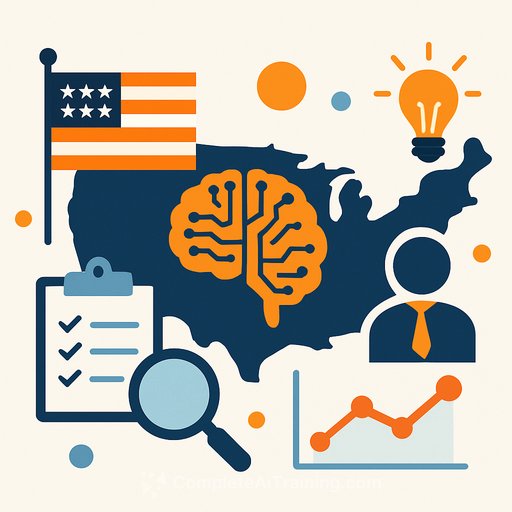Artificial Intelligence and the Need for a Coherent Government Agenda
Artificial intelligence is transforming how Americans work, learn, and access essential services. Its influence is growing steadily, making it crucial for the United States to develop a clear, government-wide AI agenda. This agenda should promote innovation and trustworthiness, grounded in solid scientific evidence.
In early 2025, the federal government requested public input on its AI Action Plan. Experts from the science and technology community provided recommendations to encourage responsible policies that accelerate AI adoption, ensure security and trust, and reinforce government institutions.
Recently, the government released its AI Action Plan, which includes promising proposals in AI research, interpretability, national security, and scientific advancement. However, some provisions raise concerns, such as limiting state regulations and removing references to diversity, equity, inclusion, and climate change from key AI risk frameworks. These omissions undermine efforts to address pressing societal challenges linked to AI technologies.
Without adequate funding, staffing, and clear timelines, the plan risks remaining aspirational. Budget cuts across government agencies contrast with the ambitious goals set, putting pressure on lawmakers to provide proper support for AI initiatives.
Promising Advances & Opportunities
AI Interpretability
Understanding how AI systems function internally is critical. The plan’s focus on AI interpretability is a positive step toward technical progress and building public trust. Recommendations include developing open-access resources, standardized benchmarks, user-centered research, and repositories of interpretability techniques.
Prioritizing interpretable AI in government procurement—especially for high-stakes applications—and fostering partnerships with AI developers for targeted research and system testing can improve transparency and reliability.
AI Research and Development
The plan outlines an ambitious agenda covering AI robustness, control, and building an AI evaluation ecosystem. Proposals like creating world-class scientific datasets and using AI to accelerate materials discovery highlight the vital role of federal support in advancing scientific research.
A Toolbox for AI Procurement
Strengthening the federal workforce’s ability to manage and deploy AI responsibly is essential. The proposed General Services Administration (GSA)-led AI procurement toolbox aligns with recommendations for resources guiding agencies through AI acquisition. Proper implementation can boost government efficiency and responsiveness.
Managing National Security Risks
The plan addresses emerging national security concerns related to AI, including biosecurity and cybersecurity. It emphasizes the role of the Center for AI Standards and Innovation (CAISI) in mitigating these risks. Establishing systems for reporting AI incidents and enhancing AI security can support these efforts.
Focused Research Organizations
Focused Research Organizations (FROs) tackle specific scientific challenges requiring coordinated efforts but lacking immediate profitability. The government’s endorsement of FROs marks an important step, building on philanthropic funding and expert proposals that align well with this model.
Where the AI Action Plan Falls Short
Restricting State-Level Guardrails
The plan proposes withholding federal AI funds from states with regulations that “hinder effectiveness,” a vague standard that could limit state innovation. Without national AI standards, states play a crucial role in developing responsible practices, and their regulatory efforts should not be easily preempted.
Failing to Address Bias in AI Systems
Removing diversity, equity, and inclusion from the NIST AI Risk Management Framework is a significant concern. AI bias is well-documented and affects critical areas like healthcare, housing, and hiring. Ignoring these issues risks perpetuating unfair outcomes and undermines public trust.
The plan’s requirement for AI models to be “free from top-down ideological bias” lacks a clear definition and may lead to inconsistent enforcement. A better approach would emphasize transparency and explainability to detect and reduce unintended bias in AI outputs.
Ignoring the Environmental Costs and Opportunities
Excluding climate change considerations from the AI risk framework overlooks the environmental impact of large-scale AI systems. Managing these impacts is crucial for sustainable AI infrastructure and adoption. Additionally, AI holds potential to address environmental challenges, a missed opportunity in the current plan.
The Importance of Public Trust
Public skepticism toward AI threatens to slow innovation and limit the benefits of emerging technologies. High standards in AI development and deployment are essential to maintaining trust and staying competitive globally.
While the AI Action Plan includes promising research directions that could build trust, some measures risk weakening safeguards. Budget cuts further complicate achieving the plan’s objectives.
Ongoing collaboration between policymakers and the scientific community is necessary to ensure AI development serves the public interest effectively and responsibly.
For those looking to deepen expertise in AI and related technologies, exploring comprehensive training options can provide practical skills to navigate this evolving landscape. Visit Complete AI Training for the latest courses and resources.
Your membership also unlocks:






